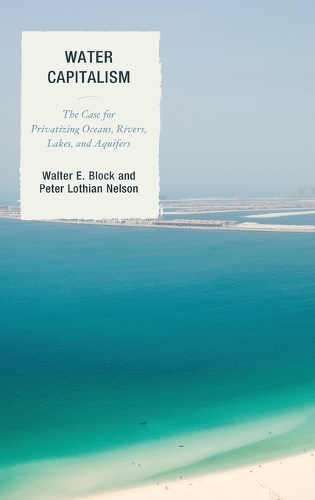
Water Capitalism: The Case for Privatizing Oceans, Rivers, Lakes, and Aquifers
(Hardback)
Available Formats
Publishing Details
Water Capitalism: The Case for Privatizing Oceans, Rivers, Lakes, and Aquifers
By (Author) Walter E. Block
By (author) Peter L. Nelson
Bloomsbury Publishing PLC
Lexington Books
30th October 2015
United States
Classifications
Professional and Scholarly
Non Fiction
Environmental economics
Economic systems and structures
Public international law: territory and statehood
338.927
Physical Properties
Hardback
302
Width 158mm, Height 237mm, Spine 27mm
581g
Description
Water covers some 75% of the earths surface, while land covers 25%, approximately. Yet the former accounts for less than 1% of world GDP, the latter 99% plus. Part of the reason for this imbalance is that there are more people located on land than water. But a more important explanation is that while land is privately owned, water is unowned (with the exception of a few small lakes and ponds), or governmentally owned (rivers, large lakes). This gives rise to the tragedy of the commons: when something is unowned, people have less of an incentive to care for it, preserve it, and protect it, than when they own it. As a result we have oil spills, depletion of fish stocks, threatened extinction of some species (e.g. whales), shark attacks, polluted and dried-up rivers, misallocated water, unsafe boating, piracy, and other indices of economic disarray which, if they had occurred on the land, would have been more easily identified as the result of the tragedy of the commons and/or government ownership and mismanagement. The purpose of this book is to make the case for privatization of all bodies of water, without exception. In the tragic example of the Soviet Union, the 97% of the land owned by the state accounted for 75% of the crops. On the 3% of the land privately owned, 25% of the crops were grown. The obvious mandate requires that we privatize the land, and prosper. The present volume applies this lesson, in detail, to bodies of water.
Reviews
I'm going to recommend your book, of course, to listeners. I dont think youre going to find another book on water body privatization. I think I can say that with a degree of confidence. But this book, which Walter Block and his co-author have just released . . . is the place to go to get a lot of very important food for thought. * The Tom Woods Show *
In this pathbreaking tour de force, Professor Walter Block of Loyola University, New Orleans, and Peter Nelson, an engineer out of Colorado specializing in water resources, lay down the case for full-throttle Water Capitalism. In free-flowing, inter-disciplinary form our authors provide a jam-packed foundation (and I do mean jam-packed; the bibliography alone is 35 pages long) for future advocacy of free markets in all things aqua. In sum, Water Capitalism is a breath of fresh air in the stagnant atmosphere of watered down quasi-defenses of aquacapitalism. Indeed, a beefy appendix is dedicated to smashing the various free market environmentalist academic and policy proposals that have preceded Water Capitalism. This section will be of utmost interest to the more scholarly inclined segment of our authors audience. Nonetheless, an inquisitive reader passionate about a free and prosperous future will find an intellectual adventure well worth setting sail for in this invaluable contribution. * San Francisco Review of Books *
Walter Block is a famous champion of property rights, and his book with Peter Nelson makes the case for private oceans, rivers, lakes, and acquifers in compelling and convincing fashion. It could also not be more timely. Water Capitalism indeed! -- Llewellyn H. Rockwell Jr., Mises Institute
In this provocative new book Walter Block and Peter Nelson thoroughly and eloquently discuss the idea of privatizing the oceans and all other bodies of water. Included in this well-researched volume are in-depth treatments of the entire spectrum of aquatic ownership concepts as well as an enlightening description of a potential aquatic privatization homesteading process. This well-written and easy-to-read treatise persuasively challenges assumptions and ideas held by people throughout the ages. -- Edward W. Younkins, Wheeling Jesuit University
Author Bio
Walter E. Block is Harold E. Wirth Endowed Chair and professor of economics in the College of Business at Loyola University New Orleans and senior fellow at the Mises Institute. Peter Lothian Nelson is former president of PLN Engineering and a professional engineer.
